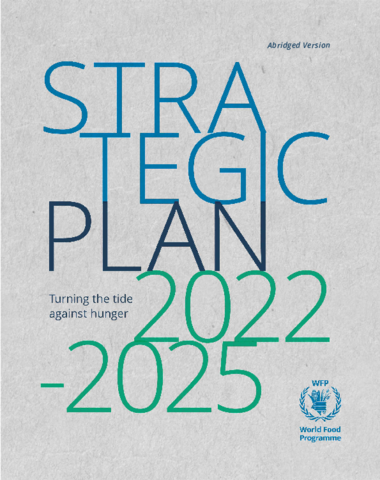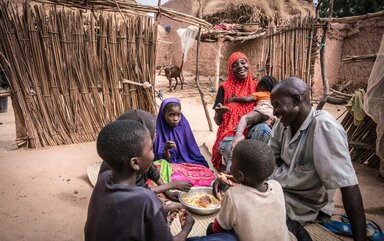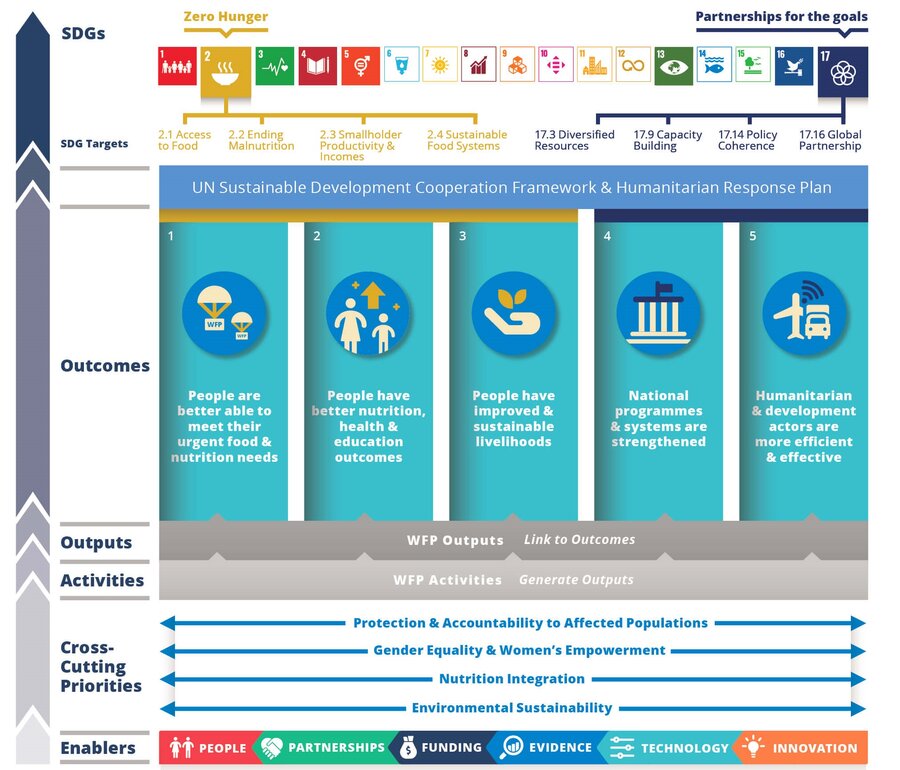

WFP Strategic Plan 2022-2025

Chronic hunger continues to rise
The 2030 Agenda for Sustainable Development affirms countries’ resolve to end poverty and hunger, reduce inequality, build peaceful societies, stimulate environmentally sustainable and inclusive economic growth, and protect human rights.
However, conflict, the climate emergency, economic inequalities and pandemics are core factors in limiting and even reversing progress on some of these aims. This puts global efforts to achieve the 2030 Agenda in jeopardy.
Our vision
WFP is fully committed to the 2030 Agenda for Sustainable Development. The organization brings strengths and capabilities to United Nations system efforts to help countries respond to the urgent needs of those furthest behind and achieve the SDGs – keeping people, the planet, prosperity, peace and partnership at the centre.
The vision for 2030 underlying WFP’s Strategic Plan for 2022–2025 is that:

How we get there

The Strategic Plan Results Framework explained
The Strategic Plan Results Framework details the components required to make WFP's vision a reality.
Realizing WFP's vision depends on achieving five outcomes, which are the product of a wide variety of activities. These activities are guided by cross-cutting priorities and empowered by enablers.
WFP in action: our outcomes
WFP's vision involves contributing to five outcomes:

Outcomes 1, 2 and 3 are relevant to SDG 2 (Zero Hunger) and encompass WFP’s humanitarian, development and peace work, from strengthening local economies to building long-term resilience and prosperity.
1. People are better able to meet their urgent food & nutrition needs
 Saving lives in emergencies remains our highest priority. WFP will maintain a laser-sharp focus on its emergency response capability, strengthening and improving its efficiency and effectiveness by systematically responding to emergencies at the right time, with the right people and skill sets and in the right manner. Activities in emergencies include food and cash transfers that restore access to food, emergency nutrition services to prevent and treat malnutrition, and targeted feeding programmes through schools and health centres. WFP also involves disaster-affected populations in work activities that help to restore key assets and basic infrastructure.
Saving lives in emergencies remains our highest priority. WFP will maintain a laser-sharp focus on its emergency response capability, strengthening and improving its efficiency and effectiveness by systematically responding to emergencies at the right time, with the right people and skill sets and in the right manner. Activities in emergencies include food and cash transfers that restore access to food, emergency nutrition services to prevent and treat malnutrition, and targeted feeding programmes through schools and health centres. WFP also involves disaster-affected populations in work activities that help to restore key assets and basic infrastructure.
2. People have better nutrition, health & education outcomes
 Humanitarian action alone cannot eradicate hunger. Unless structural vulnerabilities are also addressed, shocks and stressors will continue to generate urgent needs and increase hunger and malnutrition. WFP will therefore work with its partners to help address structural vulnerabilities and build human capital. We will do this by expanding services to address the immediate and underlying causes of malnutrition, providing nutritious school meals and strengthening social protection.
Humanitarian action alone cannot eradicate hunger. Unless structural vulnerabilities are also addressed, shocks and stressors will continue to generate urgent needs and increase hunger and malnutrition. WFP will therefore work with its partners to help address structural vulnerabilities and build human capital. We will do this by expanding services to address the immediate and underlying causes of malnutrition, providing nutritious school meals and strengthening social protection.
3. People have improved & sustainable livelihoods
 Building human capital and addressing other structural vulnerabilities lays the foundations for improved livelihoods. These, in turn, protect people from the cascading risks caused by the global climate emergency and other shocks and stressors – making sustainable solutions to hunger and malnutrition possible. Working with national counterparts and other partners, WFP’s risk-informed and integrated programmes will improve and adapt the livelihoods of the most vulnerable people in rural and urban areas.
Building human capital and addressing other structural vulnerabilities lays the foundations for improved livelihoods. These, in turn, protect people from the cascading risks caused by the global climate emergency and other shocks and stressors – making sustainable solutions to hunger and malnutrition possible. Working with national counterparts and other partners, WFP’s risk-informed and integrated programmes will improve and adapt the livelihoods of the most vulnerable people in rural and urban areas.

Outcomes 4 and 5 are relevant to SDG 17 and contribute to enabling governments and humanitarian and development actors to reach the SDGs.
4. National programmes and systems are strengthened
 Alongside its programme delivery, WFP seeks to strengthen national and local capacity and work through the country systems, presenting opportunities for scale, impact and sustainability. WFP will use its operational presence, partnerships and technical skills to strengthen national emergency preparedness and response systems, food systems and social protection systems.
Alongside its programme delivery, WFP seeks to strengthen national and local capacity and work through the country systems, presenting opportunities for scale, impact and sustainability. WFP will use its operational presence, partnerships and technical skills to strengthen national emergency preparedness and response systems, food systems and social protection systems.
5. Humanitarian & development actors are more efficient & effective

Increasingly complex operational settings and unprecedented needs mean cooperation is more important than ever. WFP will expand its provision of services, both mandated and on demand, to support its partners’ humanitarian and development activities. In particular, WFP will increase its efforts to provide critical services to humanitarian partners during crises.
Additionally, WFP will continue to contribute to advocacy and partnerships
Taking advantage of its unique international standing, extensive field presence, global reach and credibility, and as a contribution towards all outcomes, WFP will continue to advocate on behalf of the most vulnerable people.
Encouraged by the Nobel Peace Prize award in 2020, WFP will engage in humanitarian diplomacy and peace advocacy, drawing upon the knowledge that comes from its operational engagement with conflict-affected people around the world.
Our guiding principles
-
People-centred
-
WFP puts people at the heart of its programme design and response, taking care to understand the risks they face and prioritizing the most vulnerable. WFP prioritizes safety and dignity, avoidance of harm and people's access to services and assistance – in line with, and respectful of, their choices and needs. To promote inclusion and ensure no one is left behind, WFP works with partners to identify and address barriers to these services and assistance.
-
Humanitarian-principled
-
Country-owned
-
Context-specific
-
Programme-integrated
-
Risk-informed
-
Evidence-driven
Protection & accountability to affected populations
WFP empowers affected populations to express their views, preferences and priorities. This includes identifying barriers to accessing food and nutrition assistance, and the risks facing affected populations, as well as strengthening WFP’s targeting by making it more inclusive and accessible.
Gender equality & women’s empowerment
WFP supports equal opportunities, access to resources and a voice in decision making for all. WFP reviews any gender and age differences in its humanitarian responses, involves countries in its programmes to transform unequal gender relations, and provides technical expertise on gender to country offices.
Nutrition integration
WFP reduces malnutrition and improves diets by integrating nutrition objectives and activities across its portfolio. Achieving this requires investments in programmes, operations and platforms that tackle both the underlying and immediate drivers of poor diets and malnutrition, while supporting sustained improvements.
Environmental sustainability
WFP is committed to reducing the negative impact of its operations on the environment, people and communities. Environmental and social safeguards feature throughout our programmes, to systematically identify environmental and social risks.
Our enablers

People
WFP’s people are essential to achieving our strategic and operational objectives. WFP’s workforce meets the constantly changing demands of the complex environments in which we operate.
Partnerships
WFP is strengthening its vast network of partners (including governments, United Nations entities, civil society organizations, the private sector and over 900 national and international non-governmental organizations) to save and change lives.
Funding
WFP continues to advocate for flexible funding to enable a more agile response to, and bolster sustainable assistance during, protracted crises. Multi-year funding is also critical to strengthening national systems and improving people’s livelihoods.
Evidence
WFP collects and uses strong evidence, institutionalizes joint and impartial needs assessments, and uses quantitative data and qualitative research to inform decision making and operations.
Technology
WFP is committed to becoming a digitally enabled and data-driven organization. Investments in new technology and data will help WFP digitalize its operations and generate real-time data.
